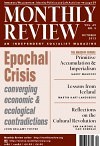Ecology
Two weeks ago I returned from my fiftieth class reunion at Oberlin College in Ohio. The brief discussions I had there with environmental faculty and students left me feeling a bit dazed. So many good and intelligent people, so concerned, and doing what they think and hope will help heal the environment—this college has one of the best environmental education programs in the country. However, I was left disappointed and profoundly discouraged by the lack of discussion—or even interest in having a real continuing discussion and debate—regarding the root causes of our environmental disasters. Not just climate change, but also pollution of the air, water, soil, and living organisms, the loss of biodiversity both aboveground and in the soil, the extinction of species, and the overuse and misuse of both renewable and nonrenewable natural resources. | more…
A Decade of Consecutive Growth or Stagnation?
China’s official statistics showed that the country’s grain production declined from 512 to 431 million tons between 1998 and 2003. However, according to the Chinese government, since 2004 it has achieved “ten years of consecutive growth” in grain production. According to the official statistics, China’s grain production reached 602 million tons in 2013, nearly 40 percent above the 2003 level.… While the official statistics claim grain production has grown rapidly, China’s surging imports of cereals and soybean suggest that its grain production has struggled to catch up with demand.… This article argues that China’s actual grain production levels may be substantially lower than the officially reported levels; in fact, grain production has stagnated since the late 1990s. | more…
Many Australians view themselves as living in a “lucky country” because it has an abundance of mineral resources. James Goodman and David Worth, however, maintain that the mining boom has been a “curse” in disguise. It has sharpened socioeconomic and community divisions, contributed to political conflict, and resulted in “ecological mal-development” with serious environmental consequences. This applies to coal in that it not only contributes to air and water pollution, but is also a major source of carbon dioxide emissions and thus a major contributor to climate change. | more…
Charles Moore with Cassandra Phillips, Plastic Ocean: How a Sea Captain’s Chance Discovery Launched a Determined Quest to Save the Oceans (New York: Penguin Group, 2011), 358 pages, $16, paperback.
Four decades ago, when most greens were blaming pollution on population growth and personal consumption, socialist-environmentalist Barry Commoner showed that neither could account for the radical increase in pollutants since the end of the Second World War. In The Closing Circle, he argued that “the chief reason for the environmental crisis…is the sweeping transformation of productive technology since World War II.” In particular, he pointed to dramatic increases in the production and use of materials not found in nature, such as synthetics that do not degrade and therefore become permanent blights on the earth.… Bottles and bags—together with blister packs, polystyrene tubs, foam peanuts, bubble wrap, styrofoam trays, candy wrappers, and a multitude of other forms of packaging—now account for a third of the plastic produced each year worldwide. It is a bizarre and extremely irrational process: producing products that are designed to be thrown away but are made from materials that never die. The second of Barry Commoner’s famous Four Laws of Ecology is: everything must go somewhere.… In his remarkable book Plastic Ocean, Charles Moore (with Cassandra Phillips) reports on the part of the “unstoppable avalanche of nonessentials” that ends up in the oceans, where it chokes and poisons fish, mammals, and birds, and endangers human life. | more…

A comparison of the present state of the natural sciences with that of the social (or human) sciences cannot but give rise to a disquieting sense of the relative poverty of the latter. Although natural scientists are raising the alarm with regard to the planetary environmental emergency and are demanding social solutions, social scientists have largely failed to take up the challenge. To be sure, there has been a vast upsurge in recent years of social-scientific discussions of climate change. But most of this work has remained confined within the narrow boundaries of mainstream social science, relying on such amorphous, dehistoricized concepts as human behavior, organizations, institutions, government, economic growth, industrialization, modernization, the market, energy efficiency, public opinion, and the like—variables that can be treated in purely technical, “non-normative” terms, divorced from historical context, social relations, and social agency.… Conspicuously missing from conventional social science is any serious consideration of the actual social system in which we live and which clearly constitutes the root of the problem: namely, capitalism. Also excluded are such fundamental issues as accumulation, class (including its gendered and racialized forms), the state, the cultural apparatus, imperialism, monopolistic corporations, economic stagnation, financialization, Marx’s concept of the metabolic rift—and indeed all the other major historical realities of our time. | more…
Gus Speth, America the Possible: Manifesto for a New Economy (New Haven: Yale University Press, 2012), 272 pages, $18, paperback.
The phrase “you’ve come a long way, Gus” kept bouncing around in my head as I read Gus Speth’s surprising new book America the Possible (Manifesto for a New Economy). The man whom Time called the “ultimate insider” tells how he was arrested in front of the White House in August 2012 and spent a couple days in the District of Columbia jail for protesting the Keystone XL pipeline.… There is little that is completely new in America the Possible for long-term Monthly Review readers, but Speth’s breathtaking admission of the futility of expecting change from working inside the establishment is totally believable. Who, after all, could be better qualified to say “Been there, done that?” What is the most useful in Speth’s book is the detailed catalogue of specific proposals which, if implemented, would revolutionize (not Speth’s word) U.S. society from top to bottom. | more…
The rediscovery over the last decade and a half of Marx’s theory of metabolic rift has come to be seen by many on the left as offering a powerful critique of the relation between nature and contemporary capitalist society. The result has been the development of a more unified ecological world view transcending the divisions between natural and social science, and allowing us to perceive the concrete ways in which the contradictions of capital accumulation are generating ecological crises and catastrophes.… Yet, this recovery of Marx’s ecological argument has given rise to further questions and criticisms. | more…
The English Diggers Today
Beginning in 2011 a festival in honor of the seventeenth-century radical Gerrard Winstanley has been held annually…commemorate[ing] the life and ideas of…Winstanley, leader of the Digger, or True Leveller, movement of the English Revolution (1640–1660). Largely forgotten for much of the eighteenth and nineteenth century, the communist thought of Winstanley was rediscovered by German and Russian Marxists in the late nineteenth century… From the socialists of the late nineteenth century to participants in the Wigan Festival in the early 2000s, Winstanley and the Diggers have provided inspiration for radical leftists for more than a hundred years.… What accounts for the lasting popularity of a relatively marginal social movement and its main theorist in the middle of seventeenth-century England? More importantly for present purposes, why have Winstanley and the Diggers held a prominent place for modern activists concerned with environmental issues and consumerism? | more…
Ian Angus constructs a strawperson in his article “The Myth of ‘Environmental Catastrophism’” (MR, September 2013), which discusses Catastrophism: The Apocalyptic Politics of Collapse and Rebirth, which consists of essays by myself, as well as Sasha Lilley, David McNally, and James Davis. The book is concerned with the political uses of catastrophe and whether actual catastrophes or catastrophic rhetoric can spur people to action. At the heart of Catastrophism is the question of politicization. My essay, which Angus primarily focuses upon, looks at the indisputably catastrophic and urgent devastation of the environment…and asks why environmental movements in the global North have not been effective at moving people to action by simply evoking the calamity of the situation. | more…

There is a pressing need for a coherent left strategy on climate change and in relation to the planetary environmental threat in general.… We therefore read with considerable interest Christian Parenti’s article, “A Radical Approach to the Climate Crisis” in the Summer 2013 issue of Dissent. Parenti’s main thesis is that since the time with which to address the climate change problem is so short, “it is this society and these [existing capitalist] institutions that must cut emissions. That means, in the short-term, realistic climate politics are reformist politics, even if they are conceived of as part of a longer-term anti-capitalist project of total economic re-organization.”… [Parenti] insists that capitalism has been successful in the past in addressing “specific environmental crises” and that this will also likely be the case with respect to climate change.… Perhaps the best way to explain…[why we believe Parenti’s overall argument is wrong] is to counterpose what we think would be a more appropriate statement on the nature of a revolutionary strategy. It would read as follows: Anyone who thinks that it is conceivable to counter climate change (and the planetary environmental crisis as a whole) without opposing and in part superseding the logic of capital accumulation is in denial of the very clear findings of climate science and critical social science—which point to the immediacy and unprecedented scale of the present epochal crisis and thus the need for truly revolutionary social change. | more…
Accumulation by Agricultural Dispossession
Land grabs—whether initiated by multinational corporations and private investment firms emanating from the capitalist core, sovereign wealth funds in the Middle East, or state entities such as China and India—are now in the news constantly. For example, in July 2013 the Colombian ambassador to the United States resigned over his participation in a legally questionable effort to help the U.S. corporation Cargill use shell companies to amass 130,000 acres of land. This land was supposed to be used for agricultural production, but there is also land being grabbed for other purposes—such as mining or to construct roads, buildings, and dams. In human terms, land grabs mean real people and families are dispossessed. When people lose access to their land, they also lose their means to obtain food, their communities, and their cultures. | more…

A sign of the crass economic culture of our times is the recent release by Hasbro of the game “Monopoly Empire” based on the well-known “Monopoly” game, first mass produced in 1935 by Parker Bothers, now a Hasbro subsidiary. The new version can be played in thirty minutes and is designed to take the friction out of the game while glorifying the modern corporate system. Players collect iconic brands of corporations such as McDonalds, Coca-Cola, Nestlé, and Samsung, which they add to billboard “towers” in a race to the top. Players no longer leave the game due to bankruptcy. The goal is simply to build the biggest monopoly brand empire. | more…


